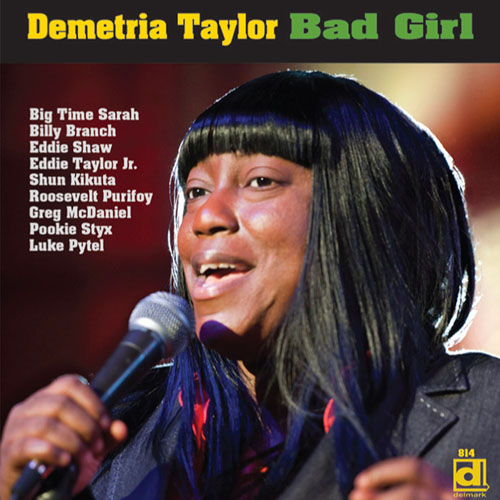Ladies Sing The Blues
Four Powerhouse Blues Queens Give ‘Em What For
By David McGee
CAN’T CONTROL MYSELF
Gina Sicilia
VizzToneLIP SERVICE
EG Kight
VizzToneBAD GIRL
Demetria Taylor
DelmarkBLACK CLOUD
Davina and the Vagabonds
Roustabout RecordsAs this is written the current issue of The New Yorker features a bewildering pop music essay contemplating the greater meaning of Beyonce and Lady Gaga. If, like your faithful friend and narrator, you bailed on this piece early on as being not merely a waste of time but a waste of life, take heart. The blues, a complete mystery to the mainstream music press at this point, continues to produce enthralling music from across the generational spectrum, especially from female artists. Four of these women—any one of them more interesting and more talented than Beyonce and Lady Gaga together—have surfaced with new albums of considerable merit, depending on how you like your blues served.
Philadelphia’s GINA SICILIA has not hurt for attention since releasing her debut CD, Allow Me To Confess, in 2007, and following it up in 2009 with the acclaimed Hey Sugar. The blues press has rightly perceived her as a singer with enormous crossover potential, owing to the ease and conviction of her explorations of country, soul, R&B and pop even as she established herself as one of the finest big-voiced belters in the blues field. With each album she has shown increasing growth as a songwriter, too. Her newest, Can’t Control Myself, will encourage those who have championed Sicilia’s impressive artistry, as it features seven new originals among its scant 10-song tunestack, with its three covers being interesting and wholly unpredictable choices, very nearly as surprising as her astonishing, heart wrenching take on Dolly Parton’s classic “Coat of Many Colors” on Hey Sugar.
Gina Sicilia performs Bobby Blue Bland’s ‘Members Only,’ off her new album, Can’t Control Myself. Producer/multi-instrumentalist Dave Gross is on guitar.The main criticism of Sicilia’s singing is akin to what greeted a young Linda Ronstadt in her Stone Poney days: that having a big voice is one thing, but knowing how to deploy it with some finesse and subtlety, instead of simply charging through songs in an awesome but one-dimensional show of power, is quite another. Ronstadt picked up on nuance pretty quickly after she became a solo artist (and met producer Peter Asher) and look what she did. With Can’t Control Myself, Sicilia is making the same strides towards a more reflective approach that retains her distinctive vocal color while probing deeper into her songs’ lyrics for more telling shades of feeling buried therein. In this pursuit she is aided immeasurably by her estimable multi-instrumentalist producer, Dave Gross, who is almost a one-man band here, playing guitars (electric, acoustic, slide), bass (acoustic and electric), drums, various keyboards (piano, Wurlitzer, B3, even a toy piano), accordion, percussion and singing backgrounds. Gross not only understands Gina Sicilia, he understands the music that makes her heart go pitty-pat, because much of what inspires her is right in his wheelhouse too. As he did on Hey Sugar, so does he do here in fashioning the captivating soundscapes framing the storyteller’s voice. One of the pleasing new wrinkles on this long player is the Latinized setting of Sicilia’s dreamy love song, “Before the Night Is Through,” with Gross’s romantic Spanish guitar flourishes (and check out his interpolation of a clever Django-like run beginning at the 2:40 mark) punctuating the shuffling beat as Sicilia tenderly beseeches her paramour for some TLC in an original song so indebted to the great Doc Pomus-Mort Shuman classic “Save the Last Dance For Me” as to be its sequel. As much as the song itself represents a stylistic departure for Sicilia, the tenderness in her reading—the subtle dips into a soft, yearning delivery, the near-whispered longings, even the restraint when the chorus comes around—bespeaks a stylist a-borning. Similarly, her affecting flights into a falsetto cry at points during “As Long As You’re Here,” her old-school R&B heart tugger fueled by Gross’s atmospheric piano, are revelatory of the vulnerability she now seems more willing to display.
Ever get the feeling that the hours, the days, the weeks, the years are speeding by faster than you can account for? So does Gina Sicilia, apparently, and she lays out the weight of that realization in her relentlessly stomping “Wish the Clock Would Stop,” with Jon-Erik Kellso’s trumpet adding a New Orleans feel to the proceedings while also serving as a kind of Greek chorus articulating a certain urgency in response to Sicilia’s anxious repeated plea in the chorus, “Oh time, punish me gently, punish me kind, won’t you be still? Oh time, easy on me, please have some mercy, I’m at your will.” The album closer, “Once In a While,” is a beauty of a country-inflected heartbreaker in which a woman asks only for as much love in return as she has been giving. In a lovely arrangement featuring Gross’s churchy B3, Wurlitzer and evocative Spanish guitar, along with Sean Daly’s gently weeping lap steel, Sicilia responds sensitively with a resigned vocal, which, in its subdued nature and its telling, upper register cry, says everything about the depth of pain inflicted by a lover’s indifference—clearly, artist and producer saved their best for last.
Gina Sicilia, ‘Crazy ‘Bout You Baby,’ from the CD Can’t Control Myself. With Debbie Davies on guitar, at the Legendary Rhythm & Blues Cruise, January 2011.The cool covers include a grungy take on “Crazy ‘Bout You Baby,” a tune from Ike & Tina Turner’s 1968 Blue Thumb gem, Outta Season, that features some of Tina’s most incendiary, absolutely possessed performances and many an example of Ike’s absolutely nasty guitar playing. Here’s where Sicilia’s lung power serves her well in spitting out the lyrics directed at a lover who can’t be bothered with her affection for him; her frustration is complemented by Gross’s filthy, snarling guitar amidst a roiling arrangement emulating the original’s searing drive while adding extra texture by way of the robust B3 burbling up through the ruckus. “Members Only,” arguably Bobby Blue Bland’s greatest latter-day recording, seizes on the original’s gospel feel and enhances it with an organ’s sturdy, solemn presence and a lonely, ruminative guitar solo but leaves the field to Sicilia to deliver a haunting, pluralistic invitation to the broken-hearted to join forces, “red or yellow, black or white”; suffice it to say she fully inhabits the song’s despair, probing its sentiments deliberately, modulating her voice—rising, falling, crying, declaiming--as if she feels every ache to the depths, yet another indication of her increasing mastery of the ballad form. On the other hand, the guitar-driven strut of Stevie Wonder’s “A Place In the Sun” and Sicilia’s confident, soaring vocal diminishes the sadness at the song’s root in favor of following Stevie’s lead in remaining confident of finding “a place where there’s hope for everyone”—a bracing bit of optimism amid these tales of love gone awry, on the one hand, and on the other, a positive statement from the past (1966) ever more relevant to our time.
Striking upon first listen and deeper on subsequent spins, Can’t Control Myself is a statement record from one of this country’s most promising young artists. Singing of this order is too real for a mainstream music press fixated on the empty posturings of Beyonce and Lady Gaga, but, in keeping with a sentiment advanced with such authority here, you have to believe an artist as gifted as Gina Sicilia will find her place in the sun. Lord knows we could use more than one Adele, and maybe she’s right here amongst us, down Philly way.
Known as the “Georgia Songbird,” EG KIGHT has delivered, in Lip Service, her sixth album, arguably her best-yet amalgamation of blues and southern soul; not least of all, it’s also a songwriting tour de force for this young veteran, who wrote or co-wrote every one of the album’s dozen tracks. In addition to the seasoned pros in her road band, the feisty Ms. Kight assembled extra instrumental support from a veritable all-star lineup of southern rock titans, including Tommy Talton (guitar), Randall Bramblett (keyboards), Bill Stewart (drums), horn players Earl Ford and Marcus Henderson, with Paul Hornsby (who has worked with pretty much anyone who’s anyone in southern rock) producing and playing keyboards. Kight herself holds down the rhythm guitar slot, and from guest vocalist John Németh (who is so impressive on the new Elvin Bishop CD reviewed in these pages last month), she’s coaxed a powerful, soulful testimony of love’s perseverance through hard times in “Somewhere Down Deep,” a deep, swirling blues swamp from which emerges new resolve on the part of hard-luck lovers.
EG Kight performs ‘Evil,’ by her friend and mentor Koko Taylor, in Sebastian, FL, July 11, 2010A friend and acolyte of the late, great Koko Taylor, Ms. Kight’s strong, reedy voice radiates confidence in her message when she gets into the greasy groove of her album opening topical discourse, “Sugar Daddies,” a rousing assessment of how the current economic climate is making its impact on the rank and file (“we’re using our credit cards to pay our rent/our stimulus checks are already spent…”), even to the point of lodging a complaint against beleaguered contemporary Daddy Warbuckses adopting austerity measures relative to the well-being of their squeezes (“…gone are the days of penthouse livin’/most rich old men they just ain’t givin’/even the sugar daddies are cuttin’ back”), with Tommy Talton stepping in with a stinging guitar solo as a prelude to a wonderful baritone sax howl by Cliff Meyers. Over sputtering horns and a bumping groove, Kight forthrightly proclaims “I’m In It To Win It” in reference to her pursuit of a man who’s caught her eye. With Talton adding some rich, Delta slide guitar flourishes over a thumping bass-drums-tambourine rhythm track, she takes a diplomatic but edgy stance in addressing a suitor who seems not to be getting some part of “I’m Happy With The One I Got Now,” the album’s low-down, earthy closer. Giving credit where credit is due, Ms. Kight also pays tribute to her mentor in a lively, driving blues homage, “Koko’s Song,” keyed by Hornsby’s joyous B3 interjections, a pumping horn section, and, from Ken Wynn, some choice fat-toned exclamations on lead guitar that underscore the singer’s declaration to “let the good times roll,” much in the manner of the great lady who inspired her in the first place.
As entertaining as she is in asserting herself (especially in situations involving over-eager men thinking with the wrong head), Ms. Kight is even more compelling when matters turn sorrowful or wistful. With Hornsby on the B3 and Bramblett on the Wurlitzer establishing a reverent, hymn-like setting for “That’s How a Woman Loves,” she essentially offers a soft, prayerful explanation of the distaff side’s true love ways that is, actually, the female counterpart to Percy Sledge’s “When a Man Loves a Woman”—indeed, the first, softly caressed lyric is “when a woman loves her man…” before the singer goes on to expand her thesis of commitment and devotion in the most soothing tones, with the slightest of melismatic flourishes revealing the depth of her passion before she takes flight in the choruses with the help of a surging horn section in an arrangement classic in dynamics and sound both. Stripping things down to only Hornsby (on piano, B3 and bass), Cliff Meyers on baritone sax and Bill Stewart on drums, Ms. Kight sensitively explores the enduring pain of a broken heart in the saloon blues of “It’s Gonna Rain All Night,” and darn if her voice doesn’t take on a bit of a Billie Holiday quality in its softer, pensive moments, with Meyers’s weeping baritone complementing the ache much as Lester Young’s tenor sax once did with Lady Day—truly a bravura performance by all concerned. Such are the pleasures—and more unmentioned in this appraisal—of Lip Service, which roams through various textures of the blues while remembering that the blues is about life. In staying focused on the things that matter EG Kight has fashioned a memorable, substantive work of art.
The spirit of Koko Taylor lives on in another impressive new blues release, Chicago belter DEMETRIA TAYLOR’s Delmark debut, Bad Girl. If the last name sounds familiar to blues fans reading this, it should: Demetria is the daughter of the famed blues guitarist Eddie Taylor, the Mississippi-born and –raised guitarist who taught his buddy Jimmy Reed how to play guitar, and became Reed’s musical touchstone, helping the latter to develop his signature laconic shuffle and fueling most of Reed’s towering recordings for the Vee-Jay label in the ‘50s and ‘60s (Taylor also recorded solo for Vee-Jay); after relocating to Chicago in 1949, the senior Taylor established himself as one of the flourishing local blues scene’s six-string wizards, an in-demand session player who recorded not only with Reed but also in support of Elmore James, Snooky Pryor, John Lee Hooker and others. Noting the void in the Chicago scene following Taylor’s death in 1985, the eminent blues historian Bill Dahl wrote: “They just don’t make ‘em like Eddie Taylor anymore.” Eddie’s most famous solo recording was 1955’s “Bad Boy,” and his daughter Demetria has reworked it from the distaff side into the title track of this album and something of a signature song for herself to boot. With Shun Kikuta (who played with Koko Taylor, among others) and her brother Eddie Taylor Jr. on guitars (and evoking the Delta blues sound Taylor Sr. cut his teeth on as a young player in Benoit), with Eddie Shaw (one of her dad's favorites) blowing a mean tenor sax, Demetria wails her way through the brisk, bristling shuffle about a gal out on her own and liable to do anything.
Persisting throughout the album, Demetria’s saucy “Bad Girl” attitude is one of her strongest vocal attributes. Much like EG Kight, Taylor’s absolute faith in her own voice draws a listener in and works its own magic by the sheer force of its personality. Though she identifies, in the liner notes, influences male and female ranging from Bessie Smith to Michael Jackson, one could be forgiven for pinpointing her as a devotee of Miss Koko, because she brings it vocally with similar force. Those doubting this assertion are advised to dig her reading of Koko’s classic “Voodoo Woman,” which features a catchy, repeating guitar riff; caustic, incisive guitar soloing; and an aggressive honking tenor sax solo (beautifully executed by Eddie Shaw) but is fueled by the righteous, tremulous growl Demetria employs to warn menfolk against crossing her, lest she unleash some avenging spirits on your sorry backsides.
Demetria Taylor, Willie Dixon’s ‘Little Red Rooster,’ with guest vocal by Big Time Sarah. Billy Branch on harmonica. From the album, Bad Girl.The Koko resonance aside, Ms. Taylor takes this occasion to honor the blues she grew up with—unlike the other albums featured in this review, hers contains no original songs but rather mines a rich vein of material from the towering Willie Dixon, Magic Sam, Luther Allison, Jimmy Reed, and her brother, Eddie Taylor, Jr. She opens with a sweaty, grinding medley of “I’m a Woman/Hoochie Coochie Man”—and when she shouts “everybody knows I’m here,” you say “Amen!”—then immediately rolls out a stomping churning rendition of Magic Sam’s cautionary advisory “All Your Love,” featuring some effective, moaning-and-howling guitar work by Shun Kikuta buttressing the singer’s assertive growl. Her rip-roaring “Big Boss Man” is a brazen retort on which she works up a full head of justifiable steam and gets ample instrumental advocacy from both a wondrous Billy Branch song-length harmonica honk along and another pungent guitar solo. With a piercing right-channel guitar solo emanating from Eddie Taylor Jr. and further moodiness supplied by Shaw’s smoky, disconsolate tenor sax, Ms. Taylor also proves herself more than up to the challenge of a tortured blues ballad when she takes ownership of Luther Allison’s “Cherry Red Wine” with a biting delivery born of her conflicted emotions—now hurt, now confused, one moment delivering an unalloyed kissoff, another a forgiving embrace—in trying to assess the state of her significant other’s mindset in matters of the heart. One of three seven-minutes-plus numbers on the album, “Cherry Red Wine”’s most telling moment comes near the end, when Ms. Taylor sings no lyrics but, as the music grinds on, simply opens her heart as she wails an anguished “yeeaah-ay-yeeaahhh," cutting loose from the restrained pose she had assumed and simply freeing the pain within. She has fun playing with Willie Dixon’s double entendre classic, “Little Red Rooster,” letting the band churn it out slowly, exhorting Kikuto as he coaxes sparks out of his guitar, and bringing in her fellow irrepressible Chicago blues mistress Big Time Sarah to lend a hand in frolicking through the tale; Branch and Big Time Sarah return for to even greater effect in the album closer, a spirited stomp through Dixon’s “Wang Dang Doodle,” all high spirits, clever guitar hijinks plus another steamy harmonica solo from Branch preceding Sarah’s no-nonsense testifying. In the liner notes Ms. Taylor says she intends to do all original songs on her next album (“I’m ready to go out there and just let the world know what I can do,” she declares). As an example of her interpretive powers, though, Bad Girl is an impressive start, enough so that the world should be eager to learn exactly what she can do when she sets her own thoughts to music.
On Black Cloud, the first of her four albums to feature all-original material, DAVINA SOWERS conjures the feel of old New Orleans, playing piano and fronting the Vagabonds, a tight quintet featuring Darren Sterud on trombone, Dan Ekmeer on trumpet and a rhythm section of drummer Connor McRae and upright bass man Michael Carvale—an unusual lineup, to be sure (no guitar, although Ms. Sowers plays ukelele on “Bee Sting”), but a highly effective one. Ms. Sowers, in addition to proving herself eminently capable of carrying the songwriting load over the course of a full album, is terrific on the 88s, whether getting down with some rocking workouts a la the bumping, bouncing, sassy strut titled “Lipstick and Chrome” or getting deeper, bluesier and more introspective, as on the quietly surging yearning of her affecting love ballad “Sugar Moon.” But it’s this Minnesota lass’s cornet-like voice with its Southern lilt and the spirited personality it reveals that elevate the whole exercise to a higher plane of feeling.
Davina & The Vagabonds, ‘Bee Sting,’ from the Black Cloud albumVocally she has a chameleon-like quality. On the languorous blues of “Bee Sting,” a song about controlling your own destiy and featuring bass man Carvale’s tasty, upper neck solo, Ms. Sowers affects a husky, Maria Muldaur tone, dips into an amusing low register for comic effect at points, and at other times has some jazzy moments when you could close your eyes and believe you’re hearing an earthier Melody Gardot; on the tortured lament “River,” wherein she blurs the line between gospel and blues, she cries over a sad, humming horn section in a manner reminiscent of the young Irma Thomas; heck, on the playful “Disappears” she even affects a Ronnie Spector “who-oah-who-oah.” But do not mistake any of these comparisons for a lack of originality on the part of Davina Sowers. She has her own voice, certainly her own way of phrasing to get inside her lyrics, and the shifting textures of her voice complement her tart comebacks, her beguiling come-ons and her assurances of being able to take care of herself, thank you. Black Cloud is delightful on every level and a real coming of age for Ms. Sowers as an artist.
Gina Sicilia’s Can’t Control Myself is available from www.amazon.com
EG Kight’s Lip Service is available from www.amazon.com
Demetria Taylor’s Bad Girl is available from www.amazon.com
Davina & The Vagabonds’ Black Cloud is available from www.amazon.com
Founder/Publisher/Editor: David McGee
Contributing Editors: Billy Altman, Laura Fissinger, Christopher Hill, Derk Richardson
Logo Design: John Mendelsohn (www.johnmendelsohn.com)
Website Design: Kieran McGee (www.kieranmcgee.com)
Staff Photographers: Audrey Harrod (Louisville, KY; www.flickr.com/audreyharrod), Alicia Zappier (New York)
E-mail: thebluegrassspecial@gmail.com
Mailing Address: David McGee, 201 W. 85 St.—5B, New York, NY 10024







